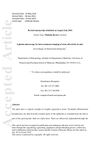 19 citations,
January 2018 in “Scientific Reports”
19 citations,
January 2018 in “Scientific Reports” Non-immune factors play a significant role in alopecia areata.
[object Object]  19 citations,
November 2017 in “Journal of Pharmaceutical Sciences”
19 citations,
November 2017 in “Journal of Pharmaceutical Sciences” A new gel containing minoxidil can treat hair loss effectively, potentially reducing side effects and improving treatment.
 19 citations,
December 2016 in “PLOS ONE”
19 citations,
December 2016 in “PLOS ONE” Early-stage skin cells help regenerate hair follicles, with proteins SDF1, MMP3, biglycan, and LTBP1 playing key roles.
 19 citations,
May 2016 in “Aging Cell”
19 citations,
May 2016 in “Aging Cell” Older people's sweat glands are less effective at helping skin wounds heal due to weaker cell connections.
 19 citations,
August 2014 in “Journal of Ethnopharmacology”
19 citations,
August 2014 in “Journal of Ethnopharmacology” The study created a test that found hormonal and toxic effects in plant and fungal extracts using prostate cancer cells.
 19 citations,
May 2014 in “Molecules”
19 citations,
May 2014 in “Molecules” Avicequinone C, a compound found in the Avicennia marina plant, can reduce hair loss by inhibiting a hormone linked to androgenic alopecia.
 19 citations,
June 1999 in “Steroids”
19 citations,
June 1999 in “Steroids” Different halogens on progesterone derivatives can either block or mimic male hormone effects, depending on their type and amount.
 18 citations,
September 2013 in “Technology”
18 citations,
September 2013 in “Technology” The study introduced a new imaging technology to track skin healing and bone marrow cell activity over time.
 18 citations,
July 2009 in “Drug Metabolism and Disposition”
18 citations,
July 2009 in “Drug Metabolism and Disposition” Finasteride breakdown products found in bile and urine, helps understand drug safety and effectiveness.
 18 citations,
January 2008 in “Sen'i Gakkaishi”
18 citations,
January 2008 in “Sen'i Gakkaishi” Thioglycolic acid and L-cysteine change hair structure differently during perms, affecting hair strength and curling efficiency.
 18 citations,
June 1999 in “Statistical Methods in Medical Research”
18 citations,
June 1999 in “Statistical Methods in Medical Research” The document concludes that PK/PD modeling is important for determining the safe and effective dosages of drugs.
 17 citations,
July 2019 in “Scientific reports”
17 citations,
July 2019 in “Scientific reports” Surface and internal treatments can help prevent hair lipid loss during washing.
 17 citations,
August 2015 in “Journal of steroid biochemistry and molecular biology/The Journal of steroid biochemistry and molecular biology”
17 citations,
August 2015 in “Journal of steroid biochemistry and molecular biology/The Journal of steroid biochemistry and molecular biology” The study found that urine metabolites M1b or M4 are the best indicators of ATD use in horses, with detection possible up to 77 hours in urine and 28 hours in blood.
 17 citations,
February 2015 in “Cell Death and Disease”
17 citations,
February 2015 in “Cell Death and Disease” Inhibiting AP1 in mice skin causes structural changes and weakens the skin barrier.
 17 citations,
November 2014 in “American Journal of Physiology-gastrointestinal and Liver Physiology”
17 citations,
November 2014 in “American Journal of Physiology-gastrointestinal and Liver Physiology” Finasteride helps brain function in rats with liver-related brain issues.
 17 citations,
June 2012 in “European journal of medicinal chemistry”
17 citations,
June 2012 in “European journal of medicinal chemistry” New steroid compounds effectively inhibit 5α-reductase and may treat hair loss.
 16 citations,
November 2020 in “International journal of pharmaceutics”
16 citations,
November 2020 in “International journal of pharmaceutics” Using longer PEG chains helps nanoparticles penetrate hair follicles better, improving drug delivery for conditions like alopecia.
 16 citations,
March 2019 in “Experimental dermatology”
16 citations,
March 2019 in “Experimental dermatology” Injury changes how hair follicle stem cells behave, depending on the hair growth stage.
 16 citations,
September 2016 in “Experimental Dermatology”
16 citations,
September 2016 in “Experimental Dermatology” Two-photon microscopy effectively tracks live stem cell activity in mouse skin with minimal harm and clear images.
 16 citations,
August 2014 in “Archives of Pharmacal Research”
16 citations,
August 2014 in “Archives of Pharmacal Research” Special nanoparticles increased skin absorption of hair loss treatments with fewer side effects.
 16 citations,
August 2004 in “Tetrahedron”
16 citations,
August 2004 in “Tetrahedron” Scientists made all eight versions of a compound called cyoctol, but found it's not an anti-androgen and it fully breaks down in the skin.
 16 citations,
January 2017 in “Physical chemistry chemical physics/PCCP. Physical chemistry chemical physics”
16 citations,
January 2017 in “Physical chemistry chemical physics/PCCP. Physical chemistry chemical physics” The 3D structure of a key hair protein was modeled, revealing specific helical structures and stabilization features.
[object Object]  15 citations,
January 2020 in “ACS Applied Materials & Interfaces”
15 citations,
January 2020 in “ACS Applied Materials & Interfaces” Nanofiber structure helps regenerate hair follicles.
 15 citations,
July 2019 in “Journal of Investigative Dermatology”
15 citations,
July 2019 in “Journal of Investigative Dermatology” CBD can either reduce inflammation and not affect hair growth at low levels or inhibit hair growth at high levels.
 15 citations,
April 2016 in “Eye”
15 citations,
April 2016 in “Eye” Finasteride effectively treats central serous chorioretinopathy.
 15 citations,
January 2015 in “Analytical Methods”
15 citations,
January 2015 in “Analytical Methods” Method accurately measures finasteride in tablets using finasteride-BSA interaction.
 15 citations,
March 2014 in “Molecular Medicine Reports”
15 citations,
March 2014 in “Molecular Medicine Reports” α-spinasterol from Melandrium firmum can help reduce prostate enlargement.
 15 citations,
April 2003 in “Journal of dermatology”
15 citations,
April 2003 in “Journal of dermatology” Alopecia areata causes hair loss due to an immune attack on hair follicles, influenced by genetics and environment.
 15 citations,
January 1998 in “Journal of Clinical Periodontology”
15 citations,
January 1998 in “Journal of Clinical Periodontology” Finasteride helps treat hair loss by blocking enzyme activity.
 15 citations,
September 1992 in “The Lancet”
15 citations,
September 1992 in “The Lancet” Stopping minoxidil caused significant hair loss, but regrowth occurred after resuming use.






























